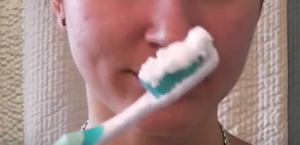Baking soda is alkaline or weak base power that is often used different cleaning applications. When used to remove stains in mouth, it releases free radicals, which are capable of attacking the stains and removing discoloration, which is caused by tobacco, beverages like tea and coffee, or other food items. Brushing teeth with baking soda, which is also known a sodium bicarbonate helps eliminate surface stains. Therefore, it can make the teeth to look whiter. However, people who use baking soda need to follow the guidelines carefully, otherwise, it may result in negative effects.
Good reasons to use baking soda to brush teeth
There are many reasons why you would want to use baking soda to brush your teeth. First, it is an attractive option because it helps polish the teeth and change their appearance to a whiter look. Second, it can help in fighting bad breath. It is also reasonably priced and can be used for other cleaning chores in homes.
It is most likely that you will have baking soda in your home, even if it is not for brushing your teeth. Its abrasive properties will help in removing plaque that is responsible for much of the tooth decay and gum disease like periodontitis and gingivitis. In order to protect your teeth, baking soda needs to be used correctly. It will give an improvement to the overall dental health while not spending a lot of money.
Using baking soda can help neutralize and act against the bacterial acids that are released in mouth. In itself, baking soda may not kill the bacteria in mouth because it does not have antibacterial properties; however, it clears the buildup of plaque and counteracts acids released through bacterial actions thereby helping protect the teeth.
Any other substances that can be used with baking soda?
Baking soda is typically used with some water in removing stains that have formed on surface of teeth. People may use it with other products such as hydrogen peroxide in order to improve the whitening effects. Individuals can use it along with the regular toothpastes.
Sometimes, people may try to use it with other products like strawberry and lemon juice; however, these may not be so ideal. The acidic properties of lemon juice may contribute to eating away or erosion of calcium from the enamel of teeth. The enamel protects the teeth by providing an outer cover and when it is acted upon by things like acid from the lemon juice, it begins to degrade. This may eventually expose the teeth to things like decay.
The erosion of enamel may bring long-term non-irreversible effects and therefore, those who use baking soda with other products should make a wise choice. They may want to talk with their dentists to get more advice on how they can whiten their teeth safely. Lemon juice may also affect the gums and could cause inflammation.
While strawberries could make the teeth to become whiter when brushing with baking soda, on the other hand, because these strawberries contain ascorbic acid, it may have same effects of damaging the enamel and affecting the gums.
How often should one brush teeth with baking soda?
It shouldn’t be used on a daily basis the way you use toothpaste simply because its abrasive properties can erode the enamel resulting in damage. Therefore, people should refrain from using it frequently. For instance, it can be used once in a week and only for two minutes in each incident of brushing.
You shouldn’t allow it to stay in the mouth for long because it will be reacting with the enamel and eating it away. On top of that, baking soda should not substitute toothpaste because it does not contain fluoride, which helps in protecting the teeth and strengthening the enamel.
Toothpastes contain fluoride, which is intended to prevent cavities and make the enamel stronger for greater protection of your teeth. However, sodium bicarbonate can be used together with the toothpaste so as to keep the teeth healthier and shiny. When using baking soda, it shouldn’t be scrubbed hard against the teeth to help protect enamel and gums.
Gentle scrubbing is needed when you use this product. In case you suffer from dental issues like sensitive teeth or gum disease, you may want to seek advice from a dentist before you use baking soda.
Are there risks involved in using baking soda to brush teeth?
Using baking may present risks of damage of your teeth when used frequently or with other products that contain acids. It may expose the enamel to actions of plaque and result in cavities and increased sensitivity to hot and cold than before.
It may also soften or weaken the adhesives and glue used to hold braces or dental fixtures and fittings. Therefore, it should not be used in such situations. Sometimes, it may not produce results if the stains are deep embedded in teeth. It works on stains which are on the surface and not those, which have penetrate inside the enamel.

